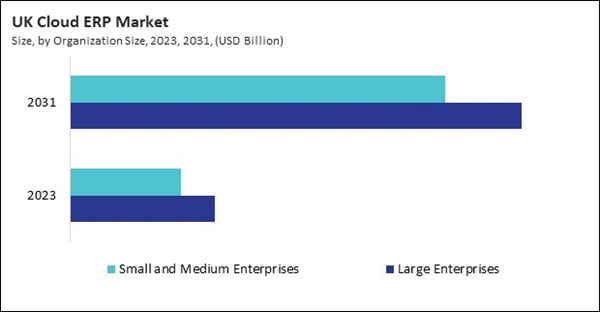The Germany market dominated the Europe Cloud ERP Market by Country in 2023, and is expected to continue to be a dominant market till 2031; thereby, achieving a market value of $7.84 billion by 2031. The UK market is exhibiting a CAGR of 16.5% during 2024-2031. Additionally, the France market would experience a CAGR of 18.5% during 2024-2031.
Cloud ERP allows employees to access personal records, apply for leave, and manage benefits, empowering them to take charge of their HR needs. By integrating analytics, cloud ERP can help organizations identify hiring trends, assess candidate fit, and streamline recruitment. Cloud ERP provides resource allocation and project tracking tools, ensuring optimal resource utilization and minimizing bottlenecks. Cloud ERP systems can support agile methodologies, allowing teams to adapt to changes quickly and manage projects iteratively.
In addition, cloud ERP can connect with IoT devices to monitor real-time production metrics, machine health, and operational efficiency. Automated quality assurance processes within cloud ERP help maintain product standards, reducing defects and recalls. Cloud ERP can help non-profits track donations, manage donor relationships, and generate reports to ensure transparency and accountability. Cloud ERP helps organizations streamline funding processes and maintain compliance with grant conditions by automating grant applications and reporting.
The rise of remote work and flexible working arrangements has further accelerated cloud adoption in the EU. Cloud ERP systems facilitate seamless collaboration among geographically dispersed teams, enabling organizations to maintain productivity regardless of location. By providing a centralized platform for accessing and sharing information, these systems help businesses respond to the challenges of a more distributed workforce. As remote work becomes a permanent fixture in many industries, the need for cloud-based solutions that support collaboration, and communication will continue to drive growth in the cloud ERP market. In conclusion, the rising cloud adoption in the EU is fundamentally transforming the market.
List of Key Companies Profiled
- IBM Corporation
- Microsoft Corporation
- SAP SE
- Hewlett Packard Enterprise Company
- Oracle Corporation
- Epicor Software Corporation
- VMware, Inc. (Broadcom Inc.)
- Infor, Inc. (Koch Industries)
- Workday, Inc.
- SYSPRO (Advent International)
Market Report Segmentation
By Component
- Solution
- Services
- Managed
- Professional
By Organization Size
- Large Enterprises
- Small and Medium Enterprises
By Deployment Type
- Hybrid
- Public
- Private
By Function
- Finance
- Operations
- Human Resource
- Marketing
- Sales
By Vertical
- BFSI
- Manufacturing
- Telecom & IT
- Healthcare and Life Sciences
- Government
- Retail
- Aerospace & Defense
- Education
- Other Verticals
By Country
- Germany
- UK
- France
- Russia
- Spain
- Italy
- Rest of Europe
Table of Contents
Companies Mentioned
- IBM Corporation
- Microsoft Corporation
- SAP SE
- Hewlett Packard Enterprise Company
- Oracle Corporation
- Epicor Software Corporation
- VMware, Inc. (Broadcom Inc.)
- Infor, Inc. (Koch Industries)
- Workday, Inc.
- SYSPRO (Advent International)









